Herb Used for Flu Relief
When it comes to finding effective ways to alleviate flu symptoms, many Americans turn to the power of herbs and natural remedies. While there are various options available, certain herbs have gained popularity for their ability to provide relief from the flu.
Key Takeaways:
- Spilanthes, echinacea, and Japanese honeysuckle are effective herbs used for flu relief in the U.S.
- Spilanthes is an immunostimulant and antimicrobial herb that can fight various infections.
- Echinacea is an immunostimulant, antiviral, and anti-inflammatory herb that can prevent and treat the common cold.
- Japanese honeysuckle is an immunostimulant, antiviral, and antibacterial herb that can alleviate hot, inflamed conditions like head colds and the flu.
- These herbs can be taken in various forms such as tinctures or teas to boost the immune system and help the body fight off infections.
Understanding the Importance of Herbal Remedies for Flu
Herbal remedies have been used for centuries to combat the flu virus and provide relief from its symptoms. In a world where synthetic medications dominate, the power of natural remedies should not be underestimated. With their flu-fighting properties and minimal side effects, herbal remedies offer a safe and effective alternative for flu prevention and relief.
One of the key advantages of herbal remedies is their ability to boost the immune system. Many herbs, such as spilanthes, echinacea, and Japanese honeysuckle, possess immunostimulant properties that help strengthen the body’s natural defense mechanisms against viral infections like the flu. These herbs work by stimulating the production of white blood cells, which play a crucial role in fighting off pathogens.
Furthermore, herbal remedies offer a holistic approach to flu relief. Unlike over-the-counter medications that often target specific symptoms, herbs address the root causes of the flu and provide comprehensive relief. For example, spilanthes is not only an immunostimulant but also an antimicrobial herb, making it effective against a wide range of infections. Echinacea, on the other hand, acts as an immunostimulant, antiviral, and anti-inflammatory herb, combating the flu virus while reducing inflammation in the body.
To incorporate herbal remedies into your flu prevention routine, there are various convenient forms available. You can find herbal tinctures, teas, capsules, and even lozenges containing these flu-fighting herbs. Each form offers its own advantages, allowing you to choose the most suitable option for your needs and preferences. Whether you prefer the convenience of a capsule or the soothing warmth of herbal tea, there is a herbal remedy that can fit seamlessly into your daily routine.
| Herb | Properties | Forms |
|---|---|---|
| Spilanthes | Immunostimulant, antimicrobial | Tincture, tea |
| Echinacea | Immunostimulant, antiviral, anti-inflammatory | Capsule, tea |
| Japanese Honeysuckle | Immunostimulant, antiviral, antibacterial | Tincture, tea |
These flu-fighting herbs offer a natural and effective way to combat the flu virus and support your overall well-being. Incorporating herbal remedies into your flu prevention routine can help strengthen your immune system and provide relief from flu symptoms. Remember to consult with a healthcare professional for guidance on the appropriate dosage and usage instructions for each herb.
The Power of Spilanthes in Flu Relief
One herb that has gained popularity for its flu-fighting properties in the United States is Spilanthes. This potent herb, also known as the “toothache plant” due to its numbing effect on the gums, has been used for centuries in traditional medicine to combat various infections. Its antiviral and immune-boosting properties make it an effective natural remedy for cold and flu.
Spilanthes contains active compounds called alkylamides, which stimulate the immune system and help the body fight off infections. These alkylamides have been found to have antimicrobial properties, making Spilanthes particularly effective against viruses and bacteria. By enhancing the body’s natural defenses, Spilanthes can help reduce the duration and severity of flu symptoms.
There are different ways to incorporate Spilanthes into your flu relief routine. You can find Spilanthes supplements in the form of tinctures or capsules, which allow for easy consumption. Alternatively, you can use the dried herb to make a soothing tea. Simply steep a teaspoon of dried Spilanthes flowers in hot water for 10-15 minutes and drink this immune-boosting brew up to three times a day. Remember to consult with a healthcare professional before starting any new herbal treatment.
Embracing the power of immune-boosting herbs like Spilanthes is a natural and holistic approach to flu relief. By harnessing the potency of plants, you can support your body’s ability to fight off infections and promote overall well-being.
| Benefits of Spilanthes: | Forms of Consumption: |
|---|---|
| 1. Antiviral properties | 1. Tincture |
| 2. Immune-boosting properties | 2. Capsules |
| 3. Alleviates flu symptoms | 3. Herbal tea |
“Spilanthes is a remarkable herb with powerful antiviral and immune-boosting properties. Its ability to fight off infections, including the flu, makes it a valuable natural remedy.”
- Spilanthes is an effective herb used for flu relief in the U.S.
- It has antiviral and immune-boosting properties.
- Spilanthes can be consumed as tinctures, capsules, or herbal tea.
- Consult with a healthcare professional before using Spilanthes or any herbal remedy.
Harnessing the Benefits of Echinacea for Flu Prevention
Echinacea, another powerful herb used for flu relief in the United States, is known for its ability to boost the immune system and fight off viral infections. This medicinal herb has been widely used for centuries as a natural remedy for influenza and other respiratory infections. Its immune-boosting properties make it an excellent choice for preventing and treating the common cold and flu.
Studies have shown that echinacea can stimulate the body’s immune response, enhancing the activity of white blood cells and increasing the production of infection-fighting substances. Its antiviral and anti-inflammatory properties further contribute to its effectiveness in preventing and treating flu symptoms. By strengthening the immune system, echinacea helps the body resist and recover from viral infections more rapidly.
Echinacea is available in various forms, including tinctures, capsules, and teas. It can be taken orally or used topically to alleviate cold and flu symptoms. Many people find it beneficial to incorporate echinacea into their daily routine, especially during flu season, to fortify their immune system and reduce the risk of falling ill.
When using echinacea as a natural flu remedy, it is important to follow the recommended dosage instructions and consult with a healthcare professional. While echinacea has been generally regarded as safe, it may interact with certain medications or have contraindications for individuals with specific health conditions. With proper usage and guidance, echinacea can be a valuable addition to your arsenal of herbal treatments for influenza.
| Echinacea | Benefits |
|---|---|
| Boosts the immune system | Helps the body fight off viral infections |
| Reduces the severity and duration of flu symptoms | Alleviates inflammation and congestion |
| Supports overall respiratory health | Strengthens the body’s defense against respiratory infections |
Overall, echinacea is a valuable herbal treatment for influenza, providing natural immune support and helping to alleviate flu symptoms. Whether taken preventatively or as part of a treatment plan, the power of echinacea in flu relief cannot be underestimated. Consult with your healthcare professional to learn more about how echinacea can be harnessed to enhance your flu prevention routine.
For those seeking natural alternatives to combat flu symptoms, Japanese honeysuckle has proven to be an effective herbal remedy. This versatile herb boasts immunostimulant, antiviral, and antibacterial properties, making it a valuable addition to your flu-fighting arsenal.
Japanese honeysuckle can help alleviate hot, inflamed conditions associated with the flu, such as head colds. Its cooling properties can provide relief from symptoms like fever, sore throat, and congestion. This herb is also known to have antiviral activity, helping to combat the underlying viral infection responsible for the flu.
To harness the benefits of Japanese honeysuckle, it can be taken in various forms. One popular option is brewing a soothing tea by steeping dried honeysuckle flowers in hot water for 10-15 minutes. Sipping on this warm herbal infusion can help ease discomfort and promote healing. Alternatively, you can find Japanese honeysuckle tinctures or syrups at health food stores, which offer a convenient and potent way to incorporate this herb into your flu-fighting routine.
To give you a better idea of the potential benefits of Japanese honeysuckle, here is a summary of its key qualities:
– Immunostimulant: Japanese honeysuckle helps boost the immune system, strengthening your body’s defenses against viral infections like the flu.
– Antiviral: This herb has shown effectiveness against a range of viruses, including those responsible for colds and the flu.
– Antibacterial: Japanese honeysuckle exhibits antibacterial properties, helping to fight off secondary bacterial infections that can occur during the flu.
– Alleviates hot, inflamed conditions: The cooling properties of Japanese honeysuckle can provide relief from symptoms like fever, sore throat, and congestion.
Incorporating Japanese honeysuckle into your flu-fighting routine can be a natural and effective way to alleviate symptoms and support your body’s healing process. Remember to consult with a healthcare professional before using any herbal remedies, especially if you have underlying health conditions or are taking medications.
To complement this information, here is a table summarizing the key properties of Japanese honeysuckle:
| Key Properties of Japanese Honeysuckle |
|---|
| Immunostimulant |
| Antiviral |
| Antibacterial |
| Alleviates hot, inflamed conditions |
Remember, when it comes to managing flu symptoms, natural remedies like Japanese honeysuckle can be a valuable tool in your wellness toolkit. Stay informed, take care of your health, and consider incorporating herbal remedies into your flu prevention and relief routine.
Different Forms of Herbal Flu Remedies
Herbal flu remedies can be consumed in different forms such as tinctures or teas, making them easily accessible for individuals seeking relief from flu symptoms. Tinctures are concentrated herbal extracts that are typically mixed with water or another liquid for consumption. They are known for their potency and fast-acting nature, making them an effective option for those looking for quick relief.
Teas, on the other hand, are a popular and soothing way to consume herbal remedies. By steeping dried herbs in hot water, the beneficial properties are extracted and can be easily ingested. Not only do herbal teas help to alleviate flu symptoms, but they also provide a comforting and relaxing experience during times of illness.
Additionally, herbal remedies can also be found in capsule or tablet form, allowing for convenient and precise dosing. These forms provide a convenient option for individuals who may not enjoy the taste of herbal teas or prefer a more controlled dosage.
Benefits of Different Forms
Each form of herbal flu remedy has its own unique benefits. Tinctures, for instance, are highly concentrated, allowing for a more potent and targeted effect. They are easily absorbed by the body, making them a preferred choice for individuals with digestive issues or those who prefer a more concentrated dose.
Herbal teas, on the other hand, offer a gentler approach and are a popular choice for those seeking a comforting and soothing experience. They can be easily customized by combining different herbs to address specific flu symptoms, such as congestion or sore throat.
Capsules and tablets provide a convenient and portable option for individuals on the go. They offer a precise and standardized dosage, ensuring consistent results. They are also ideal for those who may not enjoy the taste of herbal teas or have difficulty swallowing tinctures.
| Form | Benefits |
|---|---|
| Tinctures | Potent and fast-acting |
| Teas | Soothing and customizable |
| Capsules/ Tablets | Convenient and precise dosing |
How to Incorporate Herbal Remedies into Your Flu Prevention Routine
To maximize the benefits of herbal remedies for flu prevention, it’s important to integrate them into your daily routine alongside other healthy habits. These immune-boosting herbs can provide a natural defense against flu viruses and help strengthen your body’s immune system. Here are some tips on how to incorporate herbal remedies into your flu prevention routine:
Morning Routine:
Start your day with a cup of herbal tea infused with immune-boosting herbs such as spilanthes, echinacea, or Japanese honeysuckle. These herbs can be brewed together or individually to create a delicious and soothing beverage. Not only does the warm tea help hydrate your body, but it also provides a dose of natural antiviral and immune-strengthening properties to help ward off flu viruses.
Mealtime:
Add herbs like spilanthes, echinacea, and Japanese honeysuckle to your meals. Sprinkle them as seasonings or incorporate them in your cooking. These herbs not only add flavor to your dishes but also provide additional antiviral and immune-boosting benefits. Try adding them to soups, stews, or even salad dressings to enjoy their medicinal properties while enjoying your meals.
Nighttime Ritual:
Before bed, consider taking herbal supplements or tinctures that contain flu-fighting herbs like spilanthes, echinacea, or Japanese honeysuckle. These supplements are a convenient way to ensure you’re getting a concentrated dose of the herbs’ immune-boosting properties. Just a few drops or capsules can provide the support your body needs to stay healthy and fight off infections.
Remember to consult with a healthcare professional or herbalist before incorporating any new herbs or supplements into your routine, especially if you have any underlying health conditions or are taking medications. It’s also important to maintain a balanced diet, get enough sleep, exercise regularly, and wash your hands frequently to further reduce your risk of catching the flu.
| Herb | Benefits |
|---|---|
| Spilanthes | An immunostimulant and antimicrobial herb that can help fight various infections. |
| Echinacea | An immunostimulant, antiviral, and anti-inflammatory herb that can prevent and treat the common cold. |
| Japanese Honeysuckle | An immunostimulant, antiviral, and antibacterial herb that can alleviate hot, inflamed conditions like head colds and the flu. |
By incorporating these natural remedies into your flu prevention routine, you can give your body the extra support it needs to stay healthy and ward off the flu. Remember to listen to your body and adjust your routine as needed, and always consult with a healthcare professional for personalized advice.
The Science behind Herbal Flu Relief
Scientific studies have shown promising results regarding the effectiveness of certain herbs in providing flu relief and supporting the immune system. One such herb is Spilanthes, which is known for its immunostimulant and antimicrobial properties. It has been traditionally used to fight various infections, including the flu. Research suggests that Spilanthes can help boost the immune response and reduce the severity and duration of flu symptoms.
Echinacea is another herb that has gained recognition for its flu-fighting benefits. It acts as an immunostimulant, antiviral, and anti-inflammatory agent, making it a valuable tool in both preventing and treating the common cold and flu. Studies have shown that Echinacea can enhance the activity of immune cells, helping the body fight off viruses and reduce the risk of respiratory infections.
Japanese honeysuckle is also worth mentioning when it comes to natural flu remedies. This herb exhibits immunostimulant, antiviral, and antibacterial properties, making it effective in alleviating hot, inflamed conditions like head colds and the flu. It can help soothe sore throat, reduce fever, and aid in the recovery process. Japanese honeysuckle can be brewed into a tea or used as a topical solution to provide relief from flu symptoms.
| Herb | Properties | Benefits |
|---|---|---|
| Spilanthes | Immunostimulant and antimicrobial | Boosts immune response, reduces severity and duration of flu symptoms |
| Echinacea | Immunostimulant, antiviral, and anti-inflammatory | Enhances immune activity, prevents and treats the common cold and flu |
| Japanese Honeysuckle | Immunostimulant, antiviral, and antibacterial | Alleviates hot, inflamed conditions, soothes sore throat, reduces fever |
To incorporate these herbal remedies into your flu prevention routine, you can take them in various forms such as tinctures, teas, or capsules. These forms allow for easy absorption and assimilation into the body, enabling the herbs to work effectively in boosting your immune system and helping your body fight off infections. It’s important to consult with a healthcare professional or herbalist to determine the appropriate dosage and form of these herbs for your specific needs.
By understanding the science behind herbal flu relief, you can tap into the power of nature to support your immune system and alleviate flu symptoms. Incorporating these herbs into your routine can not only provide effective flu relief but also contribute to your overall well-being.
Conclusion
Incorporating herbal remedies into your flu relief routine can offer a natural and effective alternative to traditional medications, supporting your immune system and promoting overall wellness. There are several herbs that have been found to be particularly beneficial in providing relief from flu symptoms and preventing the onset of the flu.
Spilanthes, known for its immune-boosting and antimicrobial properties, is a powerful herb that can help fight off various infections, including the flu. Its ability to stimulate the immune system and combat harmful microorganisms makes it an excellent choice for flu relief.
Echinacea, another popular herb, is well-known for its immunostimulant, antiviral, and anti-inflammatory properties. By incorporating echinacea into your flu prevention routine, you can strengthen your immune system and reduce the severity and duration of cold and flu symptoms.
Japanese honeysuckle is yet another herb that can provide relief from flu symptoms. With its immunostimulant, antiviral, and antibacterial properties, it can help alleviate hot and inflamed conditions associated with the flu, such as head colds. Incorporating Japanese honeysuckle into your flu relief routine can help ease discomfort and support your body’s natural healing process.
When it comes to consuming herbal remedies, there are various forms available, including tinctures and teas. These forms allow for easy absorption and provide a convenient way to incorporate herbs into your daily routine.
By including herbal remedies in your flu prevention routine, you are harnessing the power of nature to support your immune system and combat the flu. These natural alternatives can offer effective relief from flu symptoms and contribute to your overall wellness. Remember to consult with a healthcare professional before starting any new herbal regimen, especially if you have underlying health conditions or are taking other medications.
FAQ
What are the effective herbs used for flu relief in the U.S.?
Spilanthes, echinacea, and Japanese honeysuckle are commonly used herbs for flu relief in the U.S.
What is the role of Spilanthes in flu relief?
Spilanthes is an immunostimulant and antimicrobial herb that can help fight various infections.
How does echinacea help prevent and treat the common cold?
Echinacea is an immunostimulant, antiviral, and anti-inflammatory herb that can prevent and treat the common cold.
What is the use of Japanese honeysuckle in flu relief?
Japanese honeysuckle is an immunostimulant, antiviral, and antibacterial herb that can alleviate hot, inflamed conditions like head colds and the flu.
In what forms can these herbs be taken for flu relief?
These herbs can be taken in various forms such as tinctures or teas to boost the immune system and help the body fight off infections.






